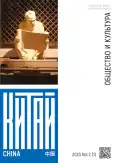On some features of the system for forming the cadres of Chinese regional elites during the period from 2007 to 2019
- Authors: Abramov B.K.1
-
Affiliations:
- Institute of China and Contemporary Asia of the Russian Academy of Sciences
- Issue: Vol 2, No 1 (2023)
- Pages: 7-15
- Section: Original Study Articles
- URL: https://bakhtiniada.ru/China_SC/article/view/250035
- DOI: https://doi.org/10.17816/Chpe321841
- ID: 250035
Cite item
Full Text
Abstract
This article is the second part of a large study on the internal policy system of the PRC, continuing the analysis of intra-party struggle in the CCP by classifying details of the biographies and terms of office of individual party officials. The correlations between the implementation of political-administrative power by certain individuals and economic transformations in the regions where they exercised their power are also examined. This research also focuses on the issue of continuity between different systems of organizing political power within the CCP, as well as on crises in this continuity, indirectly raising the question of intra-elite conflicts in the CCP. This issue is addressed by identifying career types of party officials, examining changes in the proportions of these types, and correlating these changes with known events in intra-political struggles and economic processes. The research shows that, despite the claims of some researchers, the political crisis in the PRC generally preceded the global economic crisis of 2008. This crisis reflects a shift in the system of power organization formed at the beginning of the policy of reforms and openness, and may have far-reaching consequences for the domestic and global political landscape.
Full Text
##article.viewOnOriginalSite##About the authors
Bogdan K. Abramov
Institute of China and Contemporary Asia of the Russian Academy of Sciences
Author for correspondence.
Email: bganshin@gmail.com
graduate student
Russian Federation, MoscowReferences
- Li X. et al. Political competition at a multilayer hierarchy: evidence from China. In: The Chinese Economy. London: Palgrave Macmillan; 2012. P:259–271.
- Zuenko IYu. Ukreplenie «vertikali vlasti» po-kitajski: kadrovaya politika v otnoshenii regional’nogo rukovodstva v sovremennom Kitae. Kontury global’nyh transformacij: politika, ekonomika, pravo. 2017;10(5). (In Russ.)
- Keller F. The Good, the Bad, and the Ugly. Unveiling Patronage Networks and Factions in China [Poster]. Proceedings of the Political Networks Conference; 2014; Montreal, Canada.
- Opper S, Nee V, Brehm S. Homophily in the career mobility of China’s political elite. Social Science Research. 2015;54:332–352.
- Karpov MV. Zamknutyj krug «kitajskogo chuda». Rynochnye preobrazovaniya i problema reformiruemosti partijnogo gosudarstva leninskogo tipa v Kitajskoj Narodnoj Respublike. Moscow; St Petersburg: Nestor-Istoriya; 2014. (In Russ.)
- Chen SX, Liu Y, Xu X. Dynamics of Local Cadre Appointment in China. China Economic Review. 2020;64:101559.
- Ganshin BK. Nekotorye konflikty central’nyh i lokal’nyh elit v Kitae na sovremennom etape istoricheskogo razvitiya. Moscow: HSE; 2018. (In Russ.)
- Ganshin BK. Evolyuciya kadrovoj politiki vnutri provincial’nyh elit KPK c serediny 1990-h godov po 2019 g. Moscow: HSE; 2020. (In Russ.)
- Andreeva DD. Nekotorye politekonomicheskie osobennosti kitajskoj vnutrennej torgovli na sovremennom etape. Moscow: HSE; 2019. (In Russ.)









